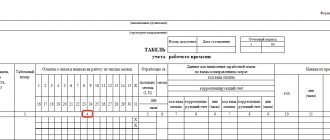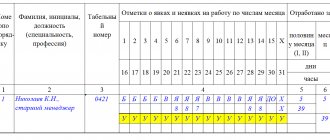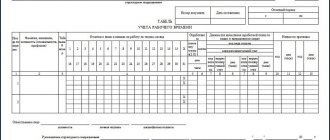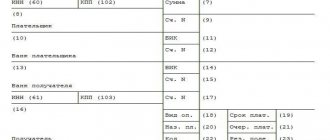Home / Labor Law / Vacation / Administrative
Back
Published: 05/09/2017
Reading time: 6 min
0
2576
Disputes among HR practitioners and discussions on the topic: “how to correctly reflect the absence time of an employee who has taken time off” are very relevant at the present time. What to do if the term is abolished in labor legislation, and most workers regularly have to “take time off” from work.
The answer is in our article.
- Who gets time off?
- Where is time off recorded?
- How is time off paid?
- Reflection in unified forms T-12 and T-13
Dear readers! To solve your problem, call hotline 8 or ask a question on the website. It's free.
Ask a Question
How to reflect time off on a timesheet?
Compliance with the Labor Code of the Russian Federation implies that employers must take into account the total number of hours worked by the company's employees. To facilitate the process, there is a so-called “time sheet”. A properly drafted document systematizes the following information:
- Labor regime of workers.
- Absence from work for various reasons, including time off.
- Carrying out work activities outside of school hours.
It is on the basis of the working time sheet that the salary is calculated. Plus, government agencies check for violations of labor laws. To correctly enter information into a document, alphabetic or numeric codes are used. The list of the latter is given on the title page of Form T-12.
Maintaining timesheets in a unified form
Currently, the State Statistics Committee has approved 2 forms of keeping records of time worked by employees of enterprises. We are talking about T-12 (Section I) and T-13. Documents may be used both in their original form and modified to suit the specific features of the organization’s activities.
Enterprises operating in the Russian Federation have the right to introduce their own procedure for filling out forms T-12 or T-13. Its features are described in the instructions or manual preceding the document. Before you reflect time off on your timesheet, you must also select codes. Commonly accepted ones include:
- RV, 03 – time worked by employees on weekends and holidays.
- OV, 27 – paid time off.
- NV, 28 – unpaid time off.
If you are hired to perform official duties on a non-working day, you must obtain the employee’s consent. For these purposes, a special order is issued, which includes the following sections:
- Name of the organization.
- Date of adoption, number and city where the enterprise is located.
- The title of the document (as an option – “On hiring on a holiday”).
- Justification for the order.
- Instructions for attracting specific employees and paying double for 1 day above the established salary.
- Position, full name and signature of the person who accepted the order.
- Full name and signatures of employees familiar with the document.
Attention! Based on the adopted order, the time sheet should indicate the time worked by employees on a non-working day.
Maintaining a timesheet in the form that is used by a specific organization
When an enterprise uses an individual form, time off in the time sheet can be marked with a generally accepted or custom code. A similar rule is regulated by Federal Law No. 402 (date of adoption - 06.12.11).
In general, work on non-working days and compensation for time worked on them are established by the norms of the Labor Code of the Russian Federation. Correctly filling out the timesheet will allow you to accurately pay employees for the hours actually worked.
Time off: important to know
Employees of any enterprise periodically have to work on weekends. This happens for various reasons. From urgent shipment of goods to the preparation of an annual report on the organization’s activities.
The employee has the right to choose the form of payment for work activities during non-working hours. First, demand a double refund. Secondly, take a one-time compensation, but with the condition of providing a day off. The employer is strictly prohibited from influencing the decisions of employees.
The category of employees who do not fall under this rule includes persons who have entered into a fixed-term employment contract with the organization for a period of at least 2 months. According to the Labor Code, their work on weekends or holidays is compensated only by double pay.
The Labor Code of the Russian Federation allows employees to be involved in the performance of official duties on weekends only in emergency cases. For example, when you need to solve urgent problems on which the successful operation of the enterprise depends. Failure to comply with this requirement grossly violates current labor legislation and can cause big problems when inspected by regulatory authorities.
Time off options
Time off, or, in official language, an additional day of rest, is allocated by the employer for previously worked time to an employee who performed work on a holiday or his own day off.
The grounds for granting time off, according to the following articles of the Labor Code, are:
- 152 – overtime worked;
- 153 – work on a day off or a non-working holiday;
- 301 – overtime processing within the limits of the drawn up work schedule on a rotational basis;
- 186 – donation of donor blood.
Time off is divided into paid and unpaid.
Paid
The day on which the donor employee donates blood is compensated by time off and paid while maintaining his average salary.
Another day off, at the specialist’s choice, can be used on the day following the blood donation, or added to the next annual leave.
How to write an application for time off? Information is in our article.
How to apply for time off as a vacation? Read.
Unpaid
If an employee performed his job duties on his day off or a national holiday, and chose an additional day off as compensation, then the working day off is paid single, and the day off is not paid.
Unpaid time off compensates the employee for the time spent on going to a business trip or returning from it if this time falls on weekends or national holidays.
If an employee is sent on a business trip specifically to work on non-working days, then monetary remuneration for each similar day worked is provided at his discretion (increased pay or single pay with time off).
Time off on a time sheet: sample
Below you can study a sample document that shows how to reflect time off on a time sheet.
Number in order
Last name, initials, position (specialty, profession)
Personnel Number
Notes on attendance and absence from work by day of the month
Total worked for the first half of the month
An employee working on weekends or holidays can count on receiving time off. Information about it is recorded in the working time sheet. An authorized person is responsible for entering time off data into the time sheet. Recording of information is necessary for further calculation of wages. The procedure is regulated by current legislation.
The data must be reflected correctly in the documentation. An error on a timesheet can cause problems. In order to prevent this, the procedure should begin with an analysis of current information on the topic.
Labor Code of the Russian Federation
Remuneration for work on holidays and non-working days is regulated by the Labor Code of the Russian Federation. If a person is forced to work during the required rest, he can count on receiving double payment or payment for 1 calendar day with the provision of 2 as time off. The law allows the use of employees at unspecified times only in case of an emergency. In accordance with the Labor Code of the Russian Federation, the grounds for providing rest may be:
- work overtime, article No. 152;
- work on holidays or rest days, article No. 153;
- donation of donor blood article No. 186;
- overtime during shift work, article No. 301.
For your information
A person can choose the form of compensation independently. An employer does not have the right to impose his opinion on a citizen. An exception to the rule is employees who work under a fixed-term contract. In this situation, the need to go to work at the wrong time is compensated only by double pay.
The procedure for provision and use according to the Labor Code of the Russian Federation
An employee can legally take a day off based on if the following events are recorded in his work schedule:
- overtime work - the provision of rest time is regulated by Article 152 of the Labor Code of the Russian Federation;
- work on a calendar day off - time off is provided, in accordance with Article 153 of the Labor Code of the Russian Federation;
- going out on a holiday is also regulated by Article 153 of the Labor Code of the Russian Federation.
The peculiarity is that during working hours previously worked overtime is replaced by rest in a proportional amount. That is, for each overtime hour, one hour of rest is provided.
If an employee worked on a weekend or holiday, then it does not matter exactly how many hours the person worked on such a day, he is given a full day of rest for his day off. Even if he worked only 2 hours on a non-working Saturday, he can take a full day off for this.
If a company needs to send its employee on a business trip to perform certain functions on a day off, then this also requires subsequent provision of time off. That is, a business trip on a weekend or holiday also allows you to take an additional day off.
In addition to days off provided on account of previously worked time, time off is also granted on other grounds established in the Labor Code.
Current labor laws do not contain a legal definition of the concept of “time off.” Typically this wording refers to an additional day off.
There are situations in which an employee is immediately given 5 days off without pay under Art. 128 Labor Code of the Russian Federation. This is done in the following cases:
- holding wedding events (provided to future spouses).
- birth of a child;
- death of a close relative.
In all of the above situations, the employer cannot refuse the request of the employee who filed the relevant petition.
This is due to the presence of significant family circumstances, which are considered valid reasons by law.
The duration of such time off is determined by agreement reached between the parties.
The right to additional rest is also present if a person is a donor; one day off is given to donate blood, and an additional one is provided as compensation.
If the reasons are not valid, then it is more difficult to get time off; we recommend reading this article, which gives recommendations on how to take days off at your own expense.
How long can I take it?
The opportunity to receive extraordinary rest for previously worked time is determined by the employee’s desire. The Labor Code of the Russian Federation does not have strict restrictions on the periods when an employee can be provided with this type of rest. Therefore, the employee has the right to take it at a convenient time in agreement with management, provided that the previously worked overtime has not been paid at an increased rate.
Often, the employer prescribes the type of compensation in the order for overtime work or for going to work on a non-working day. The order may stipulate specific terms of validity of the right to additional days off on account of previously completed work. In this case, you should be guided by this order and take time off at the prescribed time.
If this point is not specified by the employer in any way, then the duration of the time off is not regulated in any way, and the employee can write a statement at a time convenient for him, taking into account the employer’s capabilities.
Time off can be requested if the overtime is documented - there is an order, a note on the time sheet about the overtime worked.
If the documents are not completed, and the fact of leaving is agreed only in words, then it will not be possible to demand anything from the employer.
It is not recommended to delay the use of time off; you should inform in advance about your desire to receive a day off, and not additional pay. In practice, more often than not, by default, when calculating wages for the past month, all overtime is taken into account; the accountant accrues the required amount of money for previously worked time.
If overtime is paid at one and a half or double the rate, then the employee will no longer be able to receive days off.
What to do if an employee did not use time off and decided to quit - read here.
Time off on working time sheet sample
If a person goes to work on a day off, he must write a statement of consent to such an action. This fact must be reflected in the order. The time an employee works is reflected in the time sheet in accordance with the order of his superiors. Subsequently, the period is paid. The procedure is regulated by the Labor Code of the Russian Federation and Federal Law No. 402 of December 6, 2011.
Data must be recorded in documentation in accordance with established rules. To avoid mistakes, it is better to use a sample. It will allow you to clearly understand all the features of filling out the document.
Time off: definition and details
Time off means one day of rest and absence from work, however, this formulation is used only in colloquial speech. The Labor Code takes it into account, but replaces it with a working day for rest if this time has already been worked in the past. For example, you often have to go to work on Saturday or Sunday, then one of the working days of the week may become a day off. For working on a day off, you can receive a double salary increase.
Any payment for hired labor is regulated by the norms of the Labor Code of the Russian Federation. The rules for registering work on public holidays, weekends and non-working shifts according to the schedule are also spelled out in this document. Appearance in the office during the period listed above will be paid not at the usual rate for 8 or 9 working hours (depending on the enterprise), but at double. Accordingly, it is more profitable for an employee to work at such times. To compensate for processing, a specialist can choose one of the options:
- increase in wages for the current month;
- take time off from work on a day off.
The employee has every right to make an independent decision on what to do in this situation, without paying attention to the advice of the manager or personnel officers. The choice is offered from only one option if a fixed-term employment contract is concluded with a specialist for a period of no more than two months. In this case, time off cannot be reflected: only monetary compensation is available.
Important! We note one more detail that often eludes workers. If they chose time off for the time worked, they should still receive compensation in addition to their salary for going to work. It will coincide with one day's wages (not double).
https://youtu.be/pMU_3aoin4I
Time off in the time sheet in 1s
You can display information about time off on your time sheet using a special 1C program. It greatly simplifies entering data on time off. To learn how to use the program, a citizen will need to become familiar with the basic principles of operation. If you need to record work on a weekend or holiday in a time sheet, the data must be entered using the codes “РВ” or “03”. The outer lines record the duration of work activity during this period. If an employee decides to take a day off, this fact is recorded in the document using the codes “NV” or “28”. The bottom line is not filled in.
Features of payment for time off
How time off for previously worked time is paid is regulated by labor legislation and internal documents of the enterprise.
When processing
Payment of time off for overtime is 200%, i.e. The normal rate of payment is doubled. This applies to both hourly and piecework forms. However, it is worth considering that overtime for 3 hours on a regular working day will be charged according to two payment levels:
- 1 and 2 hours are paid at one and a half rates;
- After 2 hours of work, payment is double.
If the processing happened on a regular weekend or holiday, then the payment should be at least double the amount.
A special case is the payment of vacation pay. If vacation is not used, additional days off can be added to it.
Upon dismissal
A violation would be dismissal without payment of compensation. If there are no selected days off for previously worked time, then the employee must receive compensation payments in the standard amount.
If time off was planned at the end of the month, then the non-use of such days must be compensated with the same amounts that would have to be paid:
- 1.5 times in the first and second hour;
- at double rate for subsequent hours.
With a shift work schedule
A shift implies a certain amount of work. Therefore, this mode of operation requires compensation payments at the end of the month. They are paid at standard overtime rates.
Typical shift work hours are no more than 40 hours. If the employee counts more hours that were required to be worked, then the countdown of the increased tariff begins on a general basis.
For previously worked time
The employer is required to compensate paid time off in cash. As in other cases, a double factor is also applied here, that is, double the rate on a guaranteed day off or a slightly reduced rate for the first hours of overtime work on a regular day.
https://youtu.be/ZCrBq_XTZRY
Paid and unpaid time off on the timesheet
Today, there are two types of time off: paid and unpaid. In the first situation, the events specified in the law are compensated by providing a paid day off. Information must be recorded in the time sheet. For ease of filling out the document, letter designations are used. If a citizen was given a paid day off, the following mark will be placed on the report card (OB, 27). The letter designation is placed on the document form opposite the employee’s last name.
Additional payment is not always provided. If a person worked on a day off or a general public holiday and chose an additional day of rest as compensation, a single payment is provided. The additional day off itself is not paid. In this situation, it will be recorded on the report card (NV, 28).
Designations may vary. The law does not fix the exact list of symbols that must be used to reflect information about time off in documentation. The company has the right to introduce its own encryption system for recording data in the time sheet. The decision to introduce individual designations must be reflected in the company’s internal documentation.
Limitation periods
In most cases, there are no restrictions on the use of days off against time worked. An employee has the right to apply for it even after a couple of months, although it is easier for management to give it a day as quickly as possible and close the issue.
In a number of companies, internal documentation specifies the timing of granting time off, for example, within thirty days after overtime. These rules are valid if the person read the text during employment and signed his/her consent. As for the number of days and hours that are provided, they must be equivalent to the period worked.
https://youtu.be/de5_5IqybgM
Nuances
Changes are periodically made to current legislation. They may also relate to recording information about time off in the time sheet. Thus, a new rule has come into force, which requires that changes made be certified by the manager. At the same time, today it is allowed to keep a continuous time sheet or record any types of rest for employees.
There are other codes that can be used to specify the reason for providing rest. The following designations may be included in the report card:
- (I, 01) – normal working hours. The designation is supplemented by the number of hours worked.
- (C, 04) – overtime work. The authorized employee is required to record the number of hours worked, for which compensation can subsequently be received.
- (G, 23) – the donor did not show up on the day of blood donation.
The rest period must be taken into account and recorded in accordance with the standards established in the Labor Code of the Russian Federation. In order to simplify reporting and payroll, information is reflected in the time sheet. The document allows you to quickly obtain the information you are interested in without additional searching. The form of the paper is fixed by law, but the company has the right to make changes to it. By correctly filling out the document, the employer will simplify control over working hours and the specifics of accruals made in favor of employees.
Legislative regulation
In the current Labor Code of the Russian Federation, the concept of “time off for previously worked time” is absent. But this does not mean that for additional work for the benefit of the company, the employee does not have the right to receive extraordinary rest. Time off is considered to be an additional day of rest for work performed outside the main schedule.
It is important to note that for such work the employee has the right to receive:
- Additional (extraordinary) rest, the duration corresponding to the working time.
- Increased level of payment for all overtime hours.
- The opportunity to receive single pay and additional hours of rest (if such work was performed overtime).
The employer is simply obliged to provide the listed privileges.
In order to clearly regulate such a compensation procedure, it must be written down in one of these local documents:
- collective agreement of the company;
- current rules on the basis of which the internal regulations of the enterprise are regulated;
- separate local provisions approved by order of the manager (here the mandatory approval of the trade union will be required).
At the same time, given that “time off” is a colloquial term, in the documents it is replaced by the concept of “rest for previously worked time,” which is the very definition. But the latter can be found in Art. 153 Labor Code of the Russian Federation. Thus, when preparing documents, an employee can adjust them to the legislative framework.
It is the employer's responsibility to provide time off for previously worked hours. And so that the provision of time off does not turn into a routine request for it from the manager, it is necessary to initially formalize everything correctly.
Sample application for time off for vacation
Non-compliance leave upon dismissal after maternity leave is that part of the annual paid leave that the employee did not have time to use before caring for the child. Unclaimed days are subject to compensation in all cases of dismissal, including if a woman decided to leave the company without first going to work.
October 29, 2020 at 04:31 pm
Grandmother is on maternity leave instead of mother - this combination is fully permitted by law. Situations when a woman who has given birth to a baby is in a hurry to go to work as soon as possible are not at all uncommon. Since it is difficult for a woman to fully care for her child while working, this responsibility often falls on her closest relatives. It remains to understand how to arrange it correctly.
October 11, 2020 at 03:59 pm
According to the Ministry of Labor, there are 42 million pensioners living in Russia, while 14 million of them are working. We will try to answer the main questions regarding the right to leave at your own expense for pensioners under the Labor Code of the Russian Federation.
September 10, 2020 at 05:24 pm
In addition to the annual paid leave of 28 days, some citizens have the right to additional days off. We will tell you about additional vacations and the procedure for providing them.
September 02, 2020 at 11:33
Only women have the right to “maternity leave” (maternity leave), as well as benefits for it, in contrast to the right to leave and child care benefits, which can be applied for by the father of the child.










